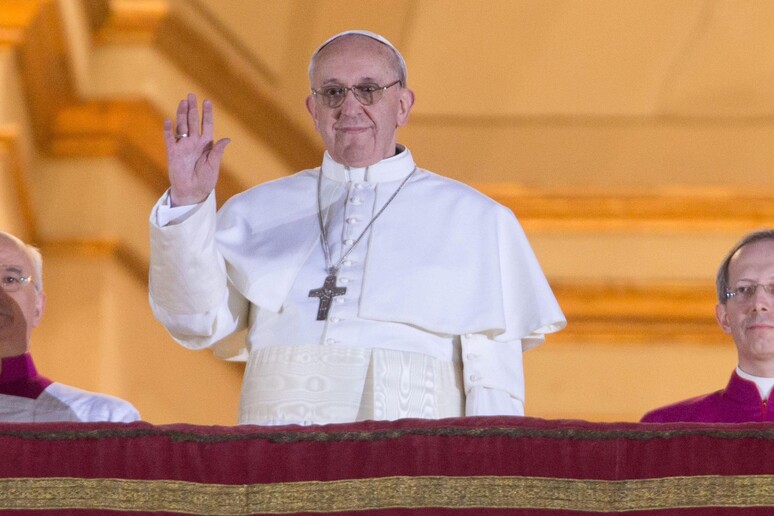The Catholic Church and the whole
world is bidding farewell to Francis, the Argentine pope who
revolutionised the biggest global religious institution since
his arrival "from the ends of the earth" to the Seat of Peter 12
years ago and who died Monday after pneumonia at the age of 88.
His 12-year pontificate was marked by an emphasis on the care
for God's Creation, attention for migrants, inclusion of gays
and divorcés, and moves to make sure clerical sexual abuse would
never recur.
Francis came to the pontificate after his predecessor Benedict
XVI's sensational abdication on March 13, 2013, and the world
first knew him for that simple "good evening" with which he
began to charm people from the window of St Peter's.
It was his first greeting to the entire world and that disarming
simplicity already heralded a breath of new, revolutionary air.
Jorge Mario Bergoglio took over the Church that very day and led
it along courageous paths, opening the doors to "everyone,
everyone, everyone," and not worrying about that wing of
Catholics who are always reluctant to try new things.
He did it after the shock of Benedict's resignation, but he was
able to turn the page in a way that was difficult even to
imagine.
Francis was born in Buenos Aires on December 17, 1936, the son
of Piedmontese migrants: his father Mario was an accountant,
employed on the railways, while his mother, Regina Sivori, took
care of the house and the education of her five children.
After graduating as a chemical technician, he then chose the
path of the priesthood by entering the seminary; in 1958 he
moved to the novitiate of the Society of Jesus, the Jesuits,
known for their intellectual rigour.
From there he began a long life in the service of the Church
until he became cardinal archbishop of his home city and then
since 2013 the 266th Pontiff of the Catholic Church.
Francis died Monday morning at 07:35, after 38 days of
hospitalization for pneumonia and a recovery that seemed to be
initially surprising during which he wanted to be among his
people, until yesterday, when he wanted to take a ride in the
popemobile on Easter Sunday.
He leaves after a very busy pontificate, not free from problems
and contradictions, but which marked such a broad turning point,
in substance and form, from which it will probably be difficult
to go back.
His term was marked by openness to divorced people, to
homosexuals, the valorization of women to the point of giving
them the place that for centuries had been reserved only for
cardinals.
And then there was his new more "outgoing" Church, towards the
most fragile, from migrants, his first concern, to the poor.
It is precisely with the poor in mind that he chose a name that
no Pope in history had ever dared to choose: Francis, like the
poor man of Assisi, also a revolutionary in his own time.
He was the first Francis, but also the first Jesuit Pope in
history, the first from the American continent, and the first
non-European in over 1200 years.
Bergoglio would bring to the heart of Christianity the
experience of his Church always reaching out to the unfortunates
of the 'villas', the most abandoned outskirts of his Buenos
Aires.
The "outskirts", geographical and existential, were in fact the
main feature of his Pontificate.
He always called on the Church to look after "the last ones, the
"discarded".
He went straight down his own path, dismantling traditions that
had lasted for centuries.
Eshcewing the grandeur and luxury of the Apostolic Palace, he
chose to live in a hostel, Casa Santa Marta.
He stripped away liturgical rites and vestments, challenged
age-old habits, and chose as cardinals pastors who work in the
most remote corners of the earth, from Mongolia to Papua New
Guinea.
He washed the feet of prisoners, migrants, transsexuals, and let
the Vatican area become a welcoming shelter for the many
homeless people of Rome.
And above all, he lived off direct relationships with people. He
greeted people, called them on the phone, and visited sick and
needy people at home, including famous ones of different
persuasions, such as Radical leader Emma Bonino and Holocaust
survivor Edith Bruck.
People were always the lifeblood of his pontificate and for this
reason he did not spare himself, continuing into his 88th year
and with all the ailments that he had accumulated. Recently he
had been suffering from bronchitis that prevented him from
giving full speeches for almost two month.
But nothing stopped him and he continued to celebrate mass in
the open square, regardless of his age, the cold and the
eventually deadly virus that was making its way into his lungs.
Bergoglio leaves a different Church, perhaps more divided. He
was loved so much by those far away, by those who had not set
foot in a sacristy for years or who perhaps had never done so,
compared to Catholics who grew up under the more comforting
guidance of Pontiffs like John Paul II or Benedict XVI.
"I see clearly that the thing the Church needs most today," he
said in 2013 in his first interview, with Jesuit journal La
Civiltà Cattolica, "is the ability to heal wounds and warm the
hearts of the faithful, closeness, proximity. I see the Church
as a field hospital after a battle. It is useless to ask a
seriously wounded person if he has high cholesterol and sugar
levels! His wounds must be healed. Then we can talk about
everything else. Heal the wounds, heal the wounds... And we must
start from the bottom".
This great and caring legacy will now be up to his successor to
carry on.
ALL RIGHTS RESERVED © Copyright ANSA











